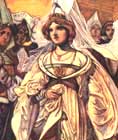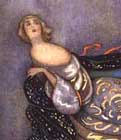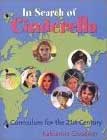
Cinderella:
345 Variants
by Marian
Roalfe Cox
SurLaLune's
Cinderella Area
SurLaLune Fairy Tales Main Page
306
Zingerle, Ignaz und Josef, Tirols Volksdichtungen und Volksgebräuche, gessamelt durch die Bruder Ignaz und Josef. Band i. Kinder- und Hausmärchen. Innsbruck, 1852. Story No. II, Pp. 5-16 (1st edition). (By word of mouth from Botzen.)
"CISTL IM KORBL."1
ABSTRACT
Heroine, orphaned and homeless, wanders in forest weeping-- Green huntsman aid--I takes her to magic oak containing treasure for her use. He will return in seven years, and she must be able to remember his name, "Cistl im Körbl"--Meflial heroine (poultry-girl)--Magic dresses from oak--Meeting-place (church)--Threefold flight--Pursuers detained with scattered silver and gold--Lovesick count--Recognition food contains ring given at third meeting--Happy marriage--Seven years have well-nigh passed; heroine cannot remember name. It is recalled to her at sight of gardener putting flat head-basket (cistl) in large basket (körbl)--She meets green huntsman; greets him by name; is told to keep it secret.
TABULATION
(1) A poor girl, whose parents die, leaving her nothing but the rags which cover her, is turned out of the house by her father's creditors, and has nowhere to go. She wanders, weeping, into the dark wood where she has so often picked raspberries and mushrooms. Since her fellow-creatures desert her she will find a corner to live in amongst the hares and deer. When night comet on, the old pines and fir-trees cast weird shadows, and the little girl is terrified, and cries bitterly.-- (2) Suddenly a hunter stands before her, and asks why she cries. He comforts her, and takes her along with him to show her some wonderful things. They go deeper and deeper into the forest, and reach a giant, moss-covered oak, beside a little rippling brook. "Open, hoary oak," says the hunter, and the great trunk opens and discloses glittering treasure-- silver dresses, and gold coins and jewels. "This is all for you", says the hunter to the astonished girl, "so long as you keep it a secret and remember my name. 'Cistl im Körbl' I am called, and in seven years I shall return. Use the treasure wisely, for your happiness depends on this, and woe betide you if you forget my name!" He has vanished before she can thank him, and the oak has closed again. She bids it open to prove it has been no dream, and with trembling hands takes out a 20-kreuzer piece and the trunk closes as before.-- (3) She now leaves the forest, having marked well the position of tree, and goes on and on, always repeating "Cistl im Körbl", till at length she reaches a fine castle, and goes to kitchen and begs cook to take her in for a night's shelter or as a servant. Cook looks her up and down, calls her a dirty beggar, and says she must be off. Heroine begins to cry, and implores the cook; till at length she is engaged to mind the hens and chickens. She must sleep in hen-house, and if a single chicken is lost, out she packs. In the daytime she drives her chickens, whispering all the time, "Cistl im Körbl," and thinking of the oak-tree.-- (4) Sunday comes, and everybody goes in their best to church. Then she goes to the oak, chooses a dress like the sun at noon, washes in the brook, and goes to church. When she enters all give place to her. She kneels to pray beside the count, who is amazed at her beauty. When mass is over she hurries out of church and away to the forest to exchange the sun-dress for her grey kirtle. The count loses all his gaiety, and gazes long in silence out of window, only longing for next Sunday. -- (5) The bells ring for mass, and heroine hies to oak-tree, chooses dress like the moon, and goes to church. Count cannot take his eyes off her, and tells his servants to follow her after service. When she finds she cannot outstrip her pursuers, she detains them by scattering 20-kreuzer pieces, resumes her rags, and returns to her chickens. The count is miserable, pining for another Sunday.-- (6) Next time heroine appears in church in a star-dress. The count is enraptured; she returns his smile, and he puts his ring on her finger. When she leaves, and his servants follow, he throws handfuls of gold to detain them.-- (7) Count falls ill no doctors can cure him. His friends counsel him to bestir himself and make merry with his young companions at a feast. There is so much to be done in the kitchen that poultry-girl must help to pluck some of her chickens. After that she must help the cook with her saucepans. She begs, and at length obtains, a little dough to make a cake herself, and slips the ring into it. Her little cake swells to such a size in the boiling grease that it has to have a plate to itself, and it locks so much nicer than the cook's cakes that it is laid before the count. When he cuts it open he nearly faints, and calls for the cook, who is terribly frightened at having to confess who made it.-- (8) Heroine is sent fur, and appears in a dress like the dawn, which she had brought with her horn the oak and kept hidden under her straw bed. All the guests rise as she enters, and the count greets her as his bride and places her beside him. They are married that evening in the castle chapel.-- (9) The happy years glide by, and they have a lovely little daughter. Suddenly heroine bethinks her of the green hunter, and of her promise to him. The seven years are nearly over, and she has quite forgotten his name. All her joy is fled-- none can cheer her.-- (10) One evening she is sitting sorrowfully at the window watching the gardeners packing up their tools. One of them has a fiat head-basket (Cistl) which he flings into his large basket (Körbl). The countess laughs aloud, crying "Cistl im Körbl", so that the count and her women rush to see what has made her glad. They rejoice to see her happy again.-- (11) Next day, when she is out walking, she meets the green hunter, and greets him by name. He smiles, and lays his fingers on his lips as a sign that she must never tell a living soul about him. Then he vanishes for ever, sad the count and countess live happily for many a year, and have two children.
1: Cistel signifies in some districts
of the Tyrol a flat head-basket, in contradistinction to Körbel,
by which is meant a basket for carrying on the back.
Return to place in text.
Cox, Marian Roalfe. Cinderella: Three Hundred and Forty-five Variants of Cinderella, Catskin, and Cap O' Rushes, abstracted and tabulated. London: David Nutt for the Folklore Society, 1893.
While the original text of this book is out of copyright, the special formatting and compilation available on SurLaLune Fairy Tales is copyrighted. Be aware that while the original content has been honored, page numbering, footnote numbering, redesigned charts, links, and other aspects are unique to this site's version of the text. Use at your own risk. For private and fair use educational purposes only.
©Heidi
Anne Heiner, SurLaLune Fairy Tales
E-mail: surlalune@aol.com
Page last updated February 1, 2006
www.surlalunefairytales.com










